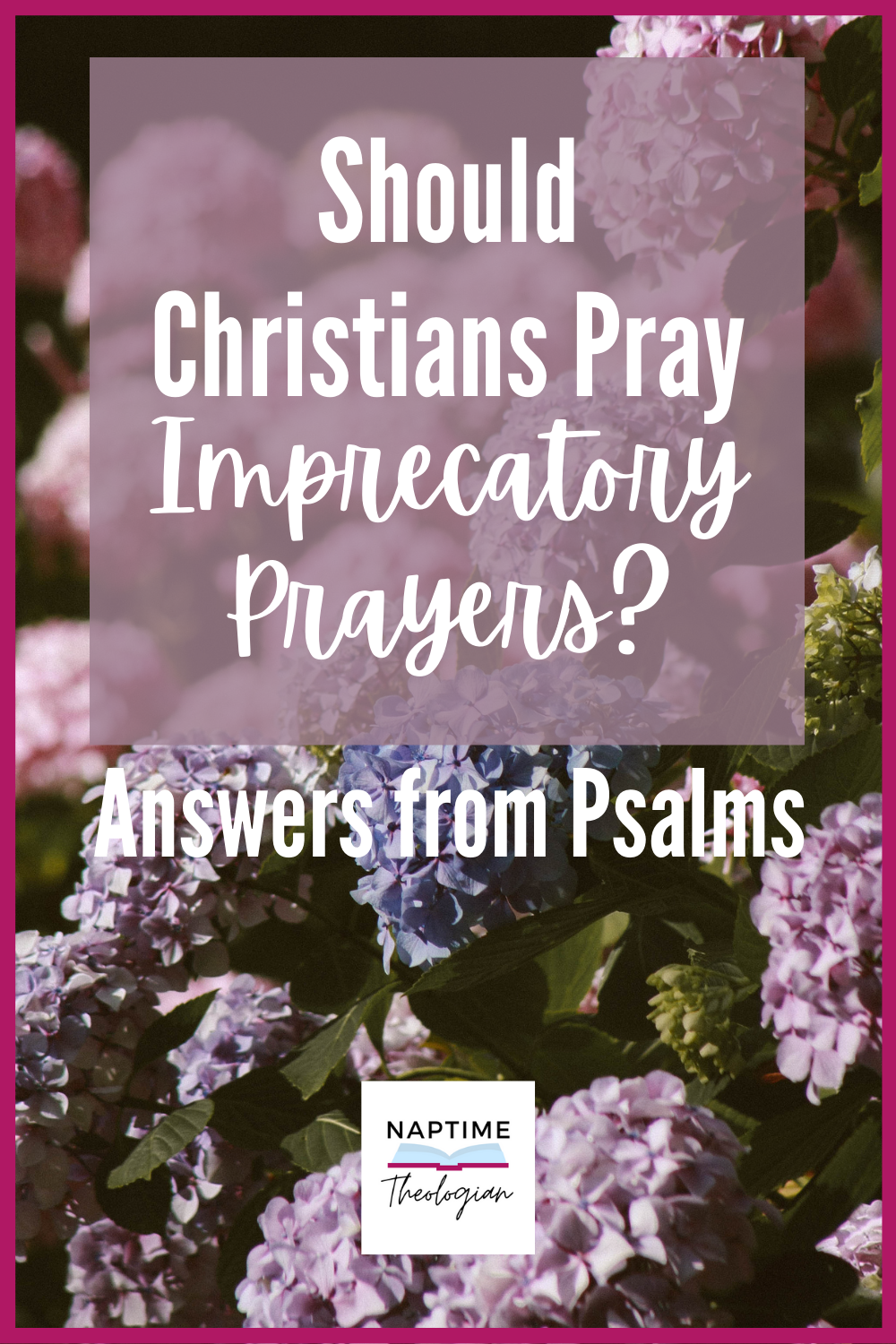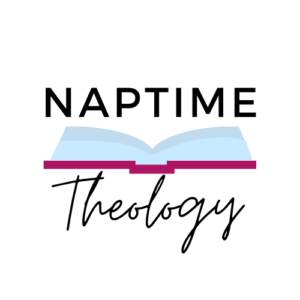How should christians deal with imprecatory prayers in Psalms?
Personally, whenever I read imprecatory prayers in the Psalms, I cringe. They are just so violent! The psalmist is literally asking God to break the teeth and bash the heads of his enemies. How does that align with a God who is love? How is that the same God who has so mercifully saved me? Should we even think that way about our enemies?
As I have studied about imprecatory prayers in the Psalms, these are the questions I wanted answers to. So, let’s see what imprecatory prayers are, who prayed them, what they show us about God, and if Christians should pray them today.
First, what are imprecatory prayers?
What Are Imprecatory Prayers?
To imprecate means to call down or invoke evil or curses on someone.
When we talk about imprecatory prayers in the Psalms, we are talking about prayers that imprecate or invoke judgment, calamity or curses upon one’s enemies or those perceived as the enemies of God.
You will recognize an imprecatory prayer whenever the psalmist writes for God to destroy or harm his enemies. Some imprecatory prayers go into a lot of detail as in Psalm 58:6, where the psalmist prays for the Lord to break the teeth of his enemies. And some are more general, like Psalm 5:6 which says, “[Lord,] You destroy those who speak lies.”
These requests that are made are to the Lord. The psalmists ask God to destroy their enemies. A lot of times, these prayers can be skipped over or ignored because of their content. They are pretty descriptive and violently so.
You can find imprecatory prayers in these Psalms: 5, 6, 11, 12, 35, 37, 40, 52, 54, 56, 57, 58, 59, 69, 79, 83, 94, 109, 137, 139, and 143.
If you go and read those Psalms, you will find that they are not filled with only imprecatory prayers. In fact, there is not a single Psalm that ONLY has imprecatory prayers. Rather each Psalm is filled with multiple subjects that usually combine these imprecatory prayers with the hope that the psalmist has in the Lord.
Just as we cannot label a whole Psalm a lament Psalm, because it always contains more than laments. We cannot label a whole Psalm as imprecatory either. They always contain more than just the invocation of curses and detriment to enemies.
Even Psalm 137, which ends violently, references God’s faithfulness to His people in verses 4-6. The psalmist highlights that God cannot forget Israel and that they are His joy. So even in one of the most imprecatory Psalms, God’s faithfulness is remembered, though dimly, and gives a glimmer of hope.
So, we should not think of entire Psalms as imprecatory. Rather, we should think of imprecatory prayers inside the Psalms themselves.
Who Prayed Imprecatory Prayers?
Now, who prayed imprecatory prayers?
Imprecatory prayers are found throughout all of the book of Psalms. Many of these prayers were written and prayed by David. Though the other authors of Psalms also wrote some. There are even some imprecatory prayers in the New Testament, though we won’t cover those presently.
We can find who wrote the Psalms by reading the superscriptions at the beginning of the Psalm. In the Bible in Hebrew, these superscriptions are actually counted as the first verse of the Psalm, so they are canonical and important to include as you read the Psalms.
Knowing the author of a Psalm from the superscription helps a lot when you are reading an imprecatory prayer in the Psalms. Sometimes the author is not mentioned, but the situation in which the Psalm was written is described in the superscription which still helps.
This is the case in Psalm 137. The superscription doesn’t have the author’s name, but does say in the LSB translation, “We Wept When We Remembered Zion.” That one sentence gives a lot of context for the Psalm and, therefore, for the imprecatory prayer within. It was written during the time of the exile and the author is weeping over remembering the glory of Jerusalem.
Imprecatory prayers were prayed in times of distress and calamity. They are visceral cries to God for justice in the midst of pain, sorrow, and, sometimes, defeat. The authors of these prayers are calling to God to enact justice and judgment on their attackers.
We must recognize that when the psalmists are asking for judgment on their enemies, they are seeking personal vengeance and/or retribution for their own suffering, but not at their own hands. They are following Paul’s encouragement from Romans 12:19, “Beloved, do not avenge yourselves, but give place to wrath. For as it is written, ‘”Vengeance is mine, I will repay.” says the Lord.'” Instead they are looking to God for vengeance and retribution for their sufferings in the fulfillment of the promises He has already made to Israel.
Enemies are the focus of these imprecatory prayers. And, if you think about it, they can be both his enemies (with a little “h”), and His enemies (with a capital “h”) because they are one and the same.
When David prayed for God’s deliverance from his enemies, he was asking for God to destroy His (capital “h”) enemies. Anyone who was an enemy of David was an enemy of God.
This is especially true in light of the promises God made to Israel as a whole in the Abrahamic covenant and to David specifically to bring the Messiah through his line. If someone was opposing David/Israel, then they were opposing God.
This is part of the reason why David prayed the way that he did. He believed the promises that were made to him and was only asking God to fulfill the promises He had made by judging evil in the world and bringing a Messiah.
David knew the promises that God made to Abraham in Genesis 12:3: “And I will bless those who bless you, and the one who curses you I will curse. And in you all the families of the earth will be blessed.” In praying the imprecatory prayers, David was asking God to keep this promise.
And even though the authors of these prayers were not perfect, as no one is, we must remember that God divinely used them to write these portions of Scripture. And because these prayers are in the Bible, they are, therefore, holy. That is true of all the authors in the Bible, God used imperfect people to write down His perfect Word through the power of the Holy Spirit because He wants us to know Him.
What Do Imprecatory Prayers Show Us About God?
In studying theology, we have to ask this question all the time: “What does it show us about God?” So for these passages, what do imprecatory prayers in Psalms show us about God?
First, imprecatory prayers show that He hates sin.
God is holy. He has never done wrong and will never do wrong. I also like to think about that in the positive sense, He will always do what’s right. His holiness is why He hates sin.
When Adam and Eve first sinned, He had to remove them from His presence and exile them out of the garden of Eden because He could not live with them in their sin (Genesis 3:22-24).
When Isaiah saw the Lord in his vision, the angels around the throne were praising God’s holiness. They said in Isaiah 6:3, “Holy, holy, holy, is the Lord of hosts, the whole earth is full of His glory.” Then Isaiah immediately cried out woes upon himself because he was a man of “unclean lips” and an angel came to him with a burning coal for cleansing.
These two examples show that God is holy. And this holiness is what caused the psalmists to pray for imprecations on their enemies. They aligned their thoughts with God and hated sin, then asked for God to be holy and bring judgment on their enemies.
Second, imprecatory prayers show that God is sovereign.
When the psalmists prayed these imprecations onto their enemies, they were trusting in God’s sovereignty. They called out to Him to fulfill what He’s promised and they knew that He would be able to do what they were asking. Matthew 5:45 says, “[God] causes His sun to rise on the evil and the good, and sends rain on the righteous and the unrighteous.”
He is sovereign over all the evil in the world, and sovereign over all the good. That is why they could pray to Him so boldly in the psalms.
Third, imprecatory prayers show that God will judge the evil and the good.
We know from Ecclesiastes 3:17 that David’s son, Solomon, believed that God would judge both the evil and the good: “I said to myself, ‘God will judge the righteous and the wicked,” for a time for every matter and for every deed is there.”
When the psalmists prayed imprecatory prayers, they knew this as well. Their prayers remind us that one day, God will judge both the evil and the good. That should be a warning to us for we will be judged. But it is also a comfort as God’s children because He will make all things right by judging the evil and the good.
Jesus will return to judge the evil and good, but He will also return to reign over us as our perfect King. That should bring hope in our hearts as we look to God to fulfill His faithfulness in the end.
Fourthly, imprecatory prayers show God’s mercy.
How can prayers that are so violent show God’s mercy? Wouldn’t they more likely show His wrath?
I would argue that the prayers on imprecation in the Psalms prove God to be merciful. The whole reason the psalmists have to pray the prayers is because God is being merciful to their evil enemies. He has not judged them right away, but relented. Which results in the psalmist calling out for judgment on his enemies.
But it is that relenting that is merciful of God. In light of their sin, God could send His enemies to hell with a snap of His finger and He would be right in doing so. But He doesn’t. He relents and gives them sunshine and rain (as we saw in Matthew 5:45) and sometimes gives them victory. Though He used the victory to judge His own people.
But even the judgment of His own people is merciful! In judging and giving suffering and hardship He is giving His people a chance to trust Him, to turn from their own sin, and to become more like Christ.
That is true for us today as well. Sometimes, the hard things we face in life today are actually mercies from God. Those tough situations we face are difficult, but God mercifully sends them to us to make us more like Christ and to bring Him glory.
Should Christians Pray Imprecatory Prayers Today?
Well, we’ve covered a lot about imprecatory prayers in the Psalms. They do a lot to show us about the authors’ lives and about the God they prayed to.
But this is perhaps the biggest question of all: Should Christians today pray imprecatory prayers from the Psalms?
My short answer? You probably already have and you just don’t know it.
But let’s dig in a bit more than that. All Psalms are inspired by God and are, therefore, holy. It’s never wrong to read God’s Word and He has placed these prayers there for a reason.
I say that you have already prayed imprecatory prayers because any time that we pray for Jesus to come back we are actually praying imprecations for His enemies. And it is definitely legitimate and evident in NT to pray for the return of Christ, and, therefore, pray for judgment on God’s enemies.
Jesus taught his disciples to pray for God’s kingdom to come in Matthew 6. Asking God’s kingdom to come means that you are asking for the Lord to return in judgment and set up His kingdom, you’re praying an imprecatory prayer.
Now, does that mean we should pray for God to “break their teeth” and “crush their heads”? In a sense, we are praying for that when we pray for God to come back in judgment. But in another sense, we aren’t.
We should pray that God’s enemies would not unjustly enjoy God’s blessings. But as believers we must pray this with hope. Hope that in experiencing God’s judgment, our enemies would repent and believe in Him. And if they are not going to repent, then God will judge them in the end anyway.
In praying for enemies to have judgment with a hope that they will repent, then we are loving our enemies. And if they do not repent, then we are simply asking the Lord to keep His promise of coming in judgment on the good and the evil.
We must also remember when the psalmists prayed these prayers. They were in distress, surrounded by their enemies, and crying out to God for help and rescue. That can also be true of us.
Though we do not face enemies physically as the psalmists did, we do battle against spiritual forces. Paul said in Ephesians 6:12, “For our struggle is not against flesh and blood, but against the rulers, against the powers, against the world forces of this darkness, against the spiritual forces of wickedness in the heavenly places.”
We do battle against sin. And sometimes the sin and wickedness of this world causes us to cry out to God for His return, for His judgment, for Him to make all wrongs right and restore His right reign. It is in those moments we are filled with hatred of sin, sometimes our own, and calling imprecations from God to make the world right, to make it honor Him.
Conclusion
As you study the Bible and read through these imprecations in the Psalms. I pray that you can see God’s judgment in light of His mercy and praise Him for His promised deliverance to come. The deliverance that the psalmists pray for in imprecations.
Related Posts:
How to Read Laments in Psalms
How to Study Psalms | 5 Methods and Resources
5 Reasons to Trust God from Psalm 23




1 Comment